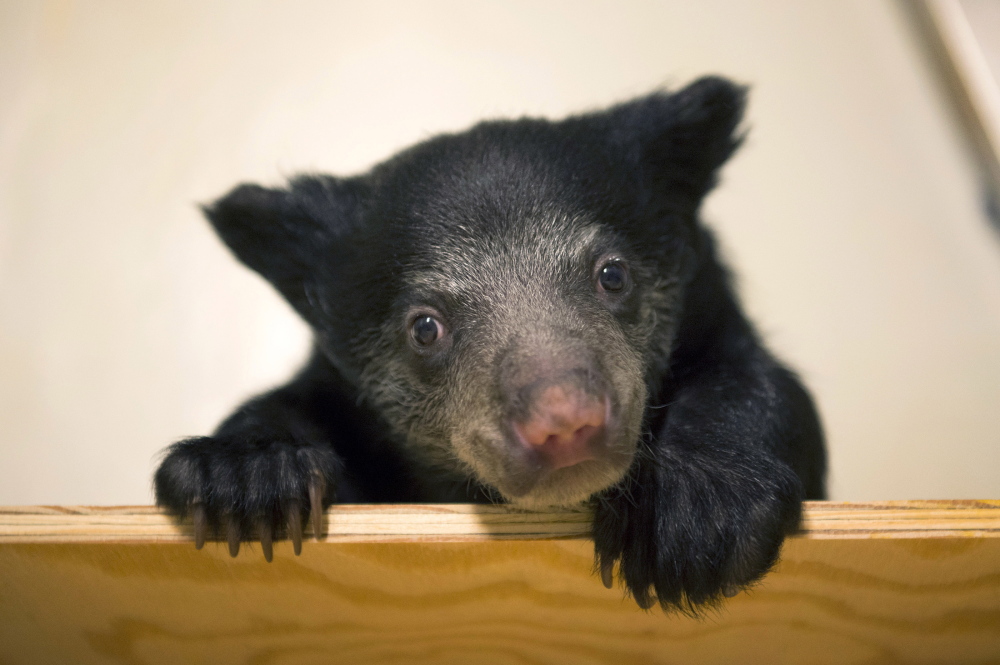WASHINGTON — When the National Zoo’s female sloth bear, Khali, delivered three cubs last December, she consumed one of them right after it was born.
Carnivores do this in the wild when there is a sick offspring. A deceased cub in the den can draw predators, the zoo said.
But a week later, when Khali consumed the second cub, keepers feared for the third. So for the first time in the zoo’s history, keepers took a sloth bear cub from its mother to raise by hand.
Three months later, after weeks of incubators, midnight feedings and quiet sessions in a rocking chair, the sickly cub has grown into a healthy 11-pound sphere of black fur and relentless curiosity.
On Tuesday, keepers showed off their foundling as it clambered around its enclosure and downed a warmed bottle of formula.
The zoo’s sloth bears are not the celebrities that their fellow bears, the giant pandas, are. Adults are shaggy, long-nosed, gap-toothed consumers of bugs.
A full-grown sloth bear can vacuum 50,000 termites a day with its flexible lips. And the zoo’s sloth bears like nothing better than a yummy handful of big, brown meal worms.
Not the thing to draw oohs and aahs from the panda crowd.
But sloth bears are highly intelligent animals, who keepers say have complex emotions – including fear and outrage – and vibrant personalities, and who enjoy watching videos.
They are far more energetic than the indolent giant pandas, their advocates say.
And the keepers are proud to have saved the animal, which comes from one of the world’s vulnerable species.
The three cubs were born Dec. 29. The first cub was eaten by the mother 20 minutes after it was born. The second was consumed Jan. 6, and the third was “pulled” from the mother a short time later.
“It’s a serious decision if you’re going to pull a cub,” said Mindy Babitz, a sloth bear expert at the zoo. “We want cubs to be raised by their mom. That’s an ideal situation. We’re doing everything we can to be a surrogate mom to her. But we’re not bears.”
Keepers extracted the frail, one-pound newborn from the den while the mother was in another area. They took it to the zoo’s animal hospital and placed it in an incubator.
“She was actually very sick when we pulled her,” Babitz said. The cub was suffering from cold and some kind of infection. She was given fluids and antibiotics and placed on a heating pad.
Babitz said Khali, who previously reared healthy cubs before she came to the zoo, may have consumed the other two because she sensed that all three were sick. Khali is in good health now.
“It’s normal for mom to consume her cub if it’s compromised in some way, or if the mom is compromised in some way,” said Babitz, who has a doctorate in animal psychology.
“Life is tough in the wild,” she said. “If a cub were to pass away and you were to just leave that carcass laying around, that would attract a predator. And that’s not safe for mom.”
“When she consumed that second cub, that’s what alerted us to, ‘Okay, something’s probably wrong,’ and that’s why we went ahead and pulled the third one,” Babitz said.
Copy the Story Link
Send questions/comments to the editors.



Success. Please wait for the page to reload. If the page does not reload within 5 seconds, please refresh the page.
Enter your email and password to access comments.
Hi, to comment on stories you must . This profile is in addition to your subscription and website login.
Already have a commenting profile? .
Invalid username/password.
Please check your email to confirm and complete your registration.
Only subscribers are eligible to post comments. Please subscribe or login first for digital access. Here’s why.
Use the form below to reset your password. When you've submitted your account email, we will send an email with a reset code.